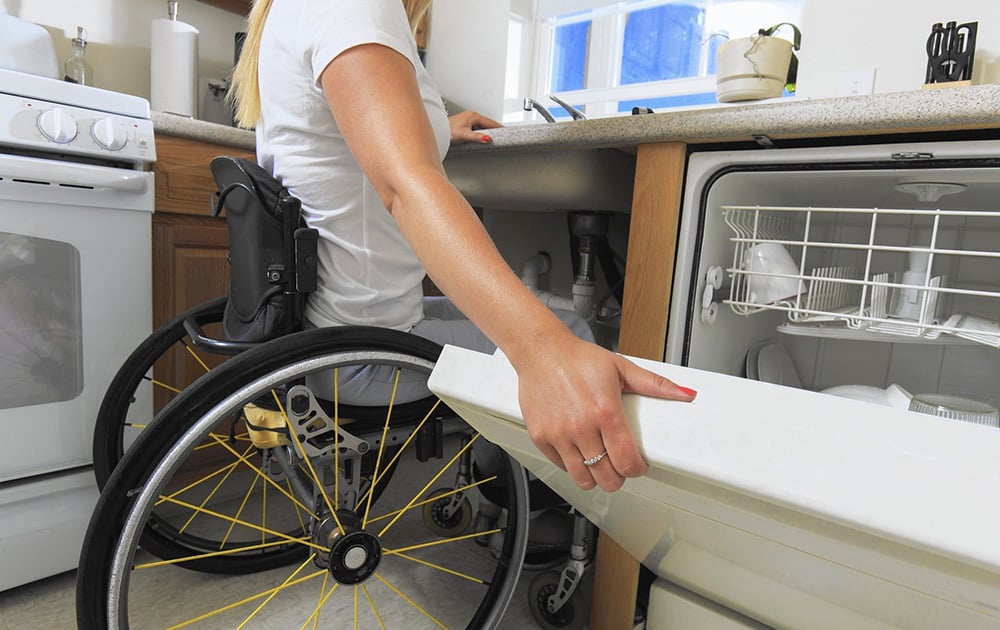Survey continues to shine spotlight on critical need to tackle accessible housing shortage

A new survey of local authorities across England has reinforced the immediate and growing need for more accessible homes over the next decade for disabled and elderly people.
Conducted by the Centre for Ageing Better, the research saw 32 local authorities provide important insights into why they are facing a shortage of accessible housing, including pushback from housing developers.
It comes as the government consults on proposals to raise building standards so all new homes are built to the mandatory base for accessibility and adaptability, as set out in Building Regulations M4 Category 2.
Currently, local authorities set out plans of how many accessible homes are needed once they can demonstrate demand in an area. But through viability assessments, developers can argue that accessible housing is prohibitively expensive and negotiate that homes are built to the lowest allowable standards.
An overwhelming 97 per cent of local authorities stated that within the next 10 years, their need for accessible homes will increase while 25 per cent described their future need as ‘severe’.
According to the results, the biggest barrier to securing accessibility of new homes is contention over viability, with just under four of five (79 per cent) identifying the problem.
In addition, challenges from developers to policies with higher accessibility standards was highlighted by almost half of the participants (48 per cent).
Despite the immediate and growing need for accessible homes, only one in five (21 per cent) of local authorities said that they would be able to deliver the number of accessible homes needed without changes to national policy.
“The need for accessible and adaptable homes is urgent and growing larger all the time,” stressed Henry Smith, Senior Programme Manager for Homes for the Centre for Ageing Better.
“The problem is that our homes are currently designed with only the first users in mind, not the dozens of households and individuals who will use it across its lifespan.”
The findings also revealed significant support among local authorities for a change in building standards, with 90 per cent welcoming a shift in national policy to prioritise accessibility.
The Centre for Ageing Better pointed out, however, that local government, housing organisations and charities are concerned that the voices of housing developers will overshadow the call for change.
According to the latest English Housing Survey, a staggering 91 per cent of homes do not provide even the lowest level of accessibility, leaving fewer than one in 10 homes suitable for older or disabled people to visit, let alone live in.
As the national population of elderly people set to rise substantially in the next two decades, with one in four people – around 17 million people – being over 65 years old, many rural communities are finding themselves ahead of the curve.
Local authorities in rural areas are witnessing greater numbers of people at older ages and a more immediate need for appropriate housing – more than one in five authorities confirmed having 44 per cent of their population of the age of 50.
In response to the findings, the Centre for Ageing Better, as part of the Housing Made for Everyone (HoME) coalition, is calling for national building standards to be raised to be ‘accessible and adaptable’ as a minimum baseline, as set out in the government’s consultation.
“The government must act now to make sure that the homes we build now are fit for the future,” continued Henry.
“Accessible housing will improve the health and wellbeing of millions of people, allowing us to remain independent and in our own homes for longer. This consultation offers a real opportunity to improve the lives of older and disabled people now and for generations to come.”
The organisation argues that if ‘accessible and adaptable’ homes become the new minimum standard, it will create a level playing field as all home builders will be factoring in the same costs and buying land with the same assumptions.
Asserting that other options on the table, including taking no action, are unacceptable, the Centre for Ageing Better warns that any delay will result in greater numbers of people forced to live in unsafe and unsuitable homes, which will increase social care needs.
The findings and declaration follow a recent joint call by the Housing Made for Everyone (HoME) coalition, urging the public and businesses to respond to the consultation before the deadline of 1 December.
To help people understand the proposals and make their voices heard, people can access a simple guide with background information and suggested responses.
https://thiis.co.uk/survey-continues-to-shine-spotlight-on-critical-need-to-tackle-accessible-housing-shortage/https://thiis.co.uk/wp-content/uploads/2018/12/generic-accessible-housing-pic.jpghttps://thiis.co.uk/wp-content/uploads/2018/12/generic-accessible-housing-pic-150x150.jpgGovernment & Local AuthoritiesHousingNewsroomReports & ResearchSector Newsaccessible homes,adaptable homes,ageing population,building developers,Building Regulations M4 Category 2,building standards,housing associations,local authorities,survey,The Centre for Ageing BetterA new survey of local authorities across England has reinforced the immediate and growing need for more accessible homes over the next decade for disabled and elderly people. Conducted by the Centre for Ageing Better, the research saw 32 local authorities provide important insights into why they are facing a...Calvin BarnettCalvin Barnettcalvin.barnett@bhta.comAuthorTHIIS Magazine

